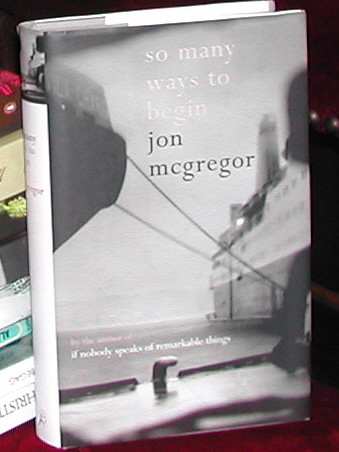
I must recommend So Many Ways to Begin wholeheartedly even though I still have a slight preference for Jon McGregor’s earlier book. I read the two books one after the other, which was perhaps a mistake, but I couldn’t wait!
It is a warm and gentle story, essentially one of memories, relationships and disappointments. David Carter is a museum curator, something he has wanted to be from a small child (parallels with the boy who catalogued all the mundane objects he found in "If Nobody speaks of Remarkable things"?).
It is a warm and gentle story, essentially one of memories, relationships and disappointments. David Carter is a museum curator, something he has wanted to be from a small child (parallels with the boy who catalogued all the mundane objects he found in "If Nobody speaks of Remarkable things"?).
The plot is developed in a potentially chaotic way, going backwards and forwards in time, with each chapter being introduced by the description of an object from David Carter’s private collection, gradually building up a picture of his family and his life from the fragments. I was never left confused though. The language is beautiful and the descriptions are fantastic – lovely attention to detail.
One thing did strike me and that was that David’s reaction to the fact that he was adopted made me feel uncomfortable. He appeared to reject his adoptive mother without any attempt to understand her feelings, in a callous and heartless way and became totally consumed by the need to find his biological mother. It almost didn’t fit with his handling of his wife’s depression which he seemed to manage much more patiently and lovingly. On the other hand I have no idea how I would react under the same circumstances.
From the Bloomsbury site a quote from Jon McGregor about how his grandparents’ marriages were one of the influences in the book:
One thing did strike me and that was that David’s reaction to the fact that he was adopted made me feel uncomfortable. He appeared to reject his adoptive mother without any attempt to understand her feelings, in a callous and heartless way and became totally consumed by the need to find his biological mother. It almost didn’t fit with his handling of his wife’s depression which he seemed to manage much more patiently and lovingly. On the other hand I have no idea how I would react under the same circumstances.
From the Bloomsbury site a quote from Jon McGregor about how his grandparents’ marriages were one of the influences in the book:
“I was struck by the strength of their marriages, and by what an achievement this had been. A quiet triumph, really, to have gone through everything they’d been through — war, separation, illness, old age, and to have maintained and nurtured their relationships through it all. This book is not ‘about’ them in any direct sense; their stories are not in the book, and neither are their characters. But their stories did inspire me to explore, and to celebrate, the quiet triumph of a long and sustained relationship.”
I like that. I can do that.
No comments:
Post a Comment
Forethoughts, afterthoughts, any thoughts. Tell me.
Please try the alternative comment form if you're having trouble commenting.